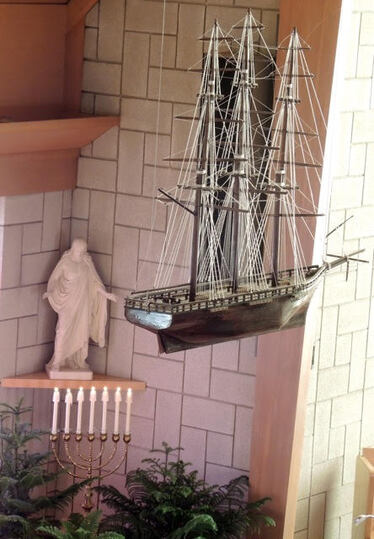|
St. Ansgar Lutheran Church, Portland, ME By THOMAS BLOM CHITTICK  In 1954, St. Ansgar Danish Evangelical Lutheran Church and Emmanuel Augustana Lutheran Church, both of Portland, Maine, merged. Because the Swedish synod was far larger in New England and the Swedish church building was bigger, the Danes moved into the Swedish church building and merged into the Augustana Synod. In exchange for these arrangements, the Danish members of the merger asked to keep the parish name, St. Ansgar, to continue using the replica of Thorvaldsen’s Christus from The Church of Our Lady (Vor Frue Kirke) in Copenhagen, the Grundtvigian seven-branched candelabrum (Syvarmede), and the model ship, the Jutta. In the move to a new church building ten years later, the model ship proved too fragile for the transition. So St. Ansgar Church went without a ship, at least until 2014 when the congregation installed a new ship model, the Follower, as it celebrated the 50th anniversary of its new building The story of the original ship, the Jutta exemplifies the symbolism that such votive ships may have. When the Nazis occupied Denmark during WWII, the home office of the Mærsk Line radioed all its ships, elsewhere in the world, advising them not to sail back to Denmark lest the Nazis commandeer them for the war effort. One such ship, the Jutta, was in the harbor in Portland, Maine where it was “marooned” for many months, long enough for the many Danish speakers of “old” St. Ansgar to often host the sailors. In gratitude for this hospitality, two of the sailors, who were model ship builders, fashioned a replica of their Jutta to be hung in St. Ansgar Church. After the war, one of the ship builders and another sailor moved with their families to Portland! The shared symbolism of the congregation’s two ships is quite interesting: its first ship, the Jutta, was from when the congregation welcomed displaced sailors during WWII and its current ship, the Follower, hangs at a time when so many people around the globe are displaced and looking for safe harbor. This symbolic connection is especially significant since the ELCA became a sanctuary denomination this past August, publicly declaring that walking alongside immigrants and refugees is a matter of faith. Why would people suspend a model ship high above in the nave of a church? Ships don’t fly. It is more than the ship being a symbol of the Christian church. It also signifies a hard truth that, in fact, we live our lives suspended above the deep unknown, like a ship sailing fathoms above the deep and having to contend with storms and other dangers, with unimaginable adventures and magnificent beauty. We live our lives with stupendous unknowns. But the other truth is that we live with these great unknowns in confidence that the ship of our lives is captained by the One who walks upon the waters of the deep. When we come and go down the aisle of the church, we are walking with confidence that this ship symbolizes our hope - hope for safe passage in our adventures, our storms, and our journey home. [email protected]
0 Comments
Leave a Reply. |
Editor InformationBridget Lois Jensen Archives
March 2023
|
Subscribe | Gift |
Submit an Article |
Contact |
© COPYRIGHT 2019 CHURCH AND LIFE.
|

 RSS Feed
RSS Feed